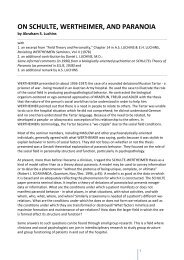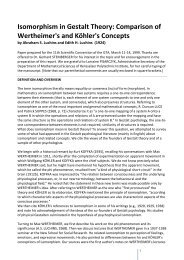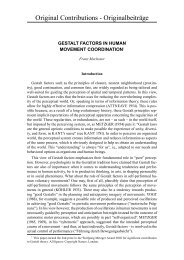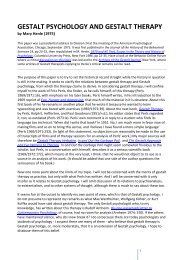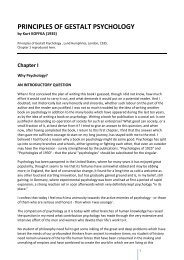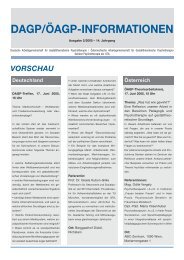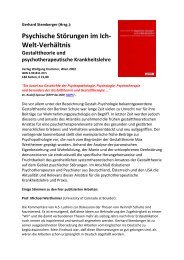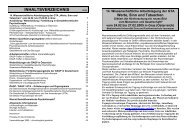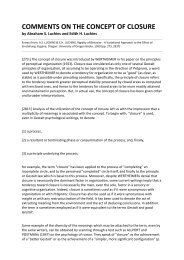pdf-Download - Society for Gestalt Theory and its Applications (GTA)
pdf-Download - Society for Gestalt Theory and its Applications (GTA)
pdf-Download - Society for Gestalt Theory and its Applications (GTA)
You also want an ePaper? Increase the reach of your titles
YUMPU automatically turns print PDFs into web optimized ePapers that Google loves.
So-called OBEs of the most varied sort frequently arise with the application of hypnagogictechniques. In the following section we will deal with them in more detail from both theconceptual <strong>and</strong> phenomenological points of view.Phenomenological Research on Non-ordinary Ego ExperiencesFor the description of non-ordinary ego-experiences we want to explain certain terms in moredetail (including some already used), <strong>and</strong> also introduce some new ones. This is not easy giventhat many phenomenological distinctions which are made in the German language can only beexpressed in English by employing metaphorical language. In addition, many terms are usedambiguously. We are thinking of such terms as "ego," "I," "me," "self," etc. Sometimes the term"ego" indicates a part or sub-system of the personality (e.g., in psychoanalysis). By contrast, weattach a phenomenological meaning to this term, as well as the others, in the fol-lowingdiscussion.By the expression "total self" we mean the phenomenal "body-soul unity" of a subject whichcomprehends the subject's phenomenal body (in our terminology, the body-ego) as well as mentalfacts (in a narrow sense) - above all, the emotions <strong>and</strong> motivations of the subject. These mentalfacts frequently appear to be bound up with the body in a fuzzy way as a kind of vessel. They canalso transcend the phenomenal body. One thinks, <strong>for</strong> example, of love or hate with theircharacteristic connections to other subjects.There is a particular point within the total-self, however, which is sometimes referred to as the"center of the self," "center of consciousness," or "center of the ego." "Ego in a narrower sense" orsomething similar is also used (<strong>for</strong> details see KÖHLER, 1938, p. 188) Due to the ambiguity of theseterms, we prefer the expression "ego-core," in accordance with the German term Ichkern. Theego-core is less an extended part of the phenomenal field than it is a place or point in thephenomenal world determined by <strong>its</strong> position <strong>and</strong> functions. Let us first consider <strong>its</strong> position in theusual waking condition.This point can be localized surprisingly well during normal observing or thinking. It is locatedwithin the phenomenal body, namely in the frontal area of the phenomenal head, a short distancebehind the bridge of the nose. Many authors claim that the ego-core (or whatever term theyprefer <strong>for</strong> this concept) is located behind the eyes. But in the phenomenological sense this iswrong because in the phenomenal world we only see by means of a single eye. (The physiologistHERING had described it as the "cyclopean eye" in the 19th century.) This eye includes the frontalarea of the phenomenal head. Based on that, we can also say that the ego-core is located behindthe center of this cyclopean eye. To avoid any misunder-st<strong>and</strong>ing, it should be emphasized thatthis localization of the ego-core only concerns the phenomenal head, not the physical head of thephysical organism. Beyond that, the ego-core should not be confused with either a fictitioushomunculus (which suggests in<strong>for</strong>mation), or with an idealistic epistemological subject whichcreates or constructs the world. The terms "homunculus" <strong>and</strong> "epistemological ego" aremetaphysical concepts which have no meaning from the st<strong>and</strong>point of critical realism (see earlierdiscussion). The ego-core can experience phenomenal objects <strong>and</strong> participate in phenomenalevents, above all through visual perception (in a phenomenological sense), imagination, memory<strong>and</strong> thought. As a rule, the ego-core is also the phenomenal origin of voluntary activities, includingvoluntarily focusing attention.10



